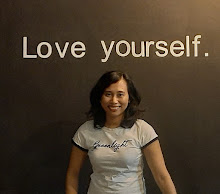SPEAKING
DIALOGUE A.
Mike : Say, Grace, how you doing?
Grace : Mike! Hey, how are you?
Mike : Not bad. Where you doing?
Grace : Over to Jerry’s. How about you?
Mike : Oh, I just got off work. Boy, I’m so hungry I could eat a horse!
Grace : Where are you working now?
Mike : J & L Steel. It’s a real pain. But I guess I shouldn’t complain. Lot’s of guys are out of work these days.
Grace : Yeah, that’s the truth. Well, I better let you go get some supper.
Mike : Yeah. It was great seeing you again. Maybe we could get together sometime.
Grace : Sounds good. I’ll be seeing you.
Mike : Thanks. Bye.
Grace : Bye.
Note:
Get of work : finish working for the day
Out of work : unemployed
*Usage note : How (are) you doing?, Where (are) you going?, I (had) better, (it) sounds good are all examples of informal speech in which words are dropped.
DIALOGUE B.
Jack : Oh, my gosh, that’s Susie Johnson!
Mike : What?
Jack : Over by the bananas. Come on, let’s go say hello. t(They go over o Susie.) Hey, Susie!
Susie : What?....Jack?!
Jack : Hey, how are you? Gee, we haven’t seen each other in…it must be close to three years!
Susie : Well, how have you been?
Jack : OK
Susie : Still working at Lamstons?
Jack : Let’s not go into that. Oh, Susie, this is Mike, one of my buddies at work.
Susie : Hi, Mike.
Mike : Hi, how are you?
Jack : Gee, we ought to go somewhere to talk. How about Peter’s Pub?
Susie : Sounds good. Just give me a minute to pick up a few things for dinner tonight.
Jack : OK. See you at the checkout stand.
Oh my gosh: an expression that shows surprise
Gee: an expression that shows surprise (see unit 6)
Buddy: good friend
Check out stand: cahier, where you pay for what you buy
Langganan:
Posting Komentar (Atom)

2 komentar:
A guide to the cost of titanium | TITanium-arts
Iron Man titanium cartilage earrings · World War ford edge titanium 2021 II · World War ion titanium hair color II · The Battle microtouch titanium of titanium 3d printing Manner · World War II.
read more wholesale jerseys,cheap jerseys,nfl jerseys,wholesale jerseys,wholesale nfl jerseys,Cheap Jerseys china,wholesale jerseys,cheap jerseys,wholesale jerseys from china,cheap nfl jerseys blog here
Posting Komentar